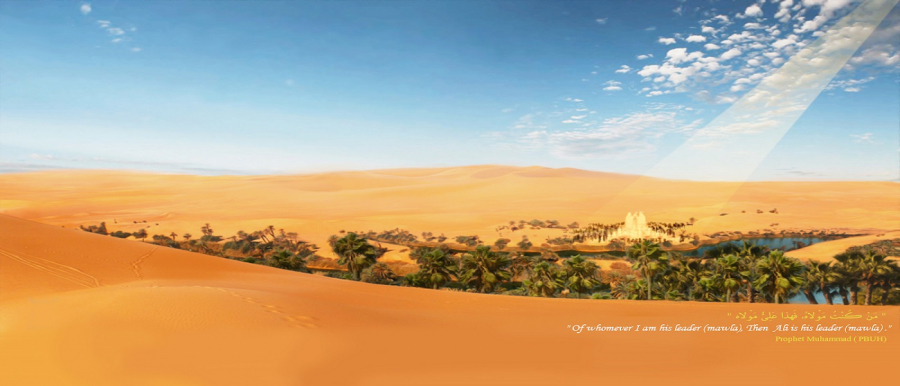Eid al-Ghadir is one of the most important historical events celebrated by many Muslims on the 18th day of the last Islamic month, Dhu al-Hijjah. Ghadir Khum is the name of a pond near Mecca. It was a place for pilgrims, who had attended the ritual of Hajj, to greet and rest a short while before taking different routes to their homes.
The Message of Allah
After completing his last pilgrimage, which was the first Muslim’s great gathering -with more than 70 thousand people- in the presence of their leader, the Messenger of Allah, Prophet Muhammad (PBUH) arrived at Ghadir Khum on the 18th of Dhu al-Hijjah where he received another revelation from God saying:
“O, Apostle! Deliver what has been sent down to you from your Lord, and if you do not, you will not have delivered His message, and Allah shall protect you from the people. Indeed Allah does not guide the faithless lot” (5:67)
Allah in this verse commanded the Prophet (PBUH) to clarify what had been previously revealed regarding Ali (AS) [i] and told him not to worry about the reaction of the people in delivering His message, for He would protect His Messenger from them.

Prophet’s Concern for the Future of Muslims
Upon receiving the above verse, the caravan stopped in the valley of Ghadir at Prophet’s command. According to some sources, about 12,000 people from Yemen had come to attend that year’s Hajj, which was known as “The farewell pilgrimage” (Hajj-at-Alvida). Despite the different route that they had to take to their homes, they were asked by prophet Muhammad (PBUH) to choose the way which passed the place of Ghadir, so that they could be present at the time when the incident of Ghadir was taking place.
Then he sent for all people who had gone ahead to return and waited for those who had fallen behind to arrive and gather. At noon that day, the Prophet (PBUH) performed the prayer in congregation with a great population of people behind him. When the prayer was finished, Prophet Muhammad (PBUH) ascended the pulpit his followers had set up from the camel saddles and gave his famous sermon in a loud voice. He started his speech by praising Allah, announced the heart-breaking news of his oncoming death and then stated:
“Verily, I am leaving behind two precious things (thaqalayn) among you: The Book of God (Quran) and my kindred (itrah), my household (Ahl al Bayt), for indeed, the two will never separate until they come back to me by the Pond (of al Kawthar on the Judgement's Day)” [1].
The Prophet’s Authority over all Muslims
The Prophet (PBUH), in an attempt to remind Muslims of his own authority over them, asked: “Who has more of a right over the believers than their own selves?” Everyone present proclaimed: “Allah and His Prophet know better.”
The Prophet (PBUH) then said: “Allah is my master and I am the master of all the believers, and I have more right and authority over the believers than they have over their own selves.”
Imam Ali (AS), the Divinely Appointed Successor of the Prophet (PBUH)
Thereupon, he took Imam Ali (AS)’s hand, raised it up and continued:
“Whomsoever I am his leader (Mawla), Ali (AS) is also his leader (Mawla). O’ Allah! Love those who love him (Ali (AS)) and oppose those who oppose him” [2].
The Angel of Revelation, Gabriel, once again descended by the order of Allah and revealed the following verse of the Quran:
“Today I have perfected your religion for you, and I have completed My blessing upon you, and I have approved Islam as your religion” (5:3).

The day of Congratulations and Happiness
This day has been marked in history as a Grand Eid for many Muslims since then. It is also known as the Day of Leadership (Imamate) and Mastership (Wilayat), which is among the critical beliefs of Islam and the axioms of this holy religion.
A large number of Muslims around the world hold special celebrations, congratulate one another on this day and say:
“All praise belongs to Allah who has made us amongst those who hold firm to the Mastership (Wilayat) of the Commander of the Faithful (Amir al-Muminin) -Ali ibn Abi Talib (AS)- and the Imams” [3].
Notes:
[i] According to the narration of Yawm al-Dar (The Day of invitation to his Home), the Prophet(PBUH) was commissioned in the third year of his prophethood to declare his call to Islam openly. This is clearly stated in the Holy Quran:
وَأَنذِرْ عَشِيرَتَكَ الأَقْرَبِينَ.
“Warn the nearest of your kinsfolk” (26:214).
After this, the Prophet(PBUH), invited his close relatives to his uncle Abu Talib’s house, after having their meal, he started to say: O Children of Abd al-Muttalib. I swear to God I know of no one among the Arabs who could have brought anything better than I have brought for you. I have brought for you prosperity here and your future. God has ordered me to invite you to my religion. Who among you will assist me in being my brother, helper, and successor?
No one showed any interest except for Ali (AS) who was the youngest. He rose up, saying: “O Messenger of God. I will be your assistant in this affair.”
The Prophet (PBUH) put his hand around Ali’s neck and said:
إنَّ هَذا أَخِي وَوَصِيِّي وَخَلِيفَتِي فِيكُمْ فَاسْمَعُوا لَهُ وَأَطِيعُوا.
“This brother of mine is my helper, and successor. Listen to him and obey his commands” [4].
References:
[1] http://www.shia.es
[2] https://www.al-islam.org
[3] http://www.imamreza.net
[4] http://www.erfan.ir
[5] http://www.roshd.org
[6] https://www.al-islam.org


















